- Home
- Tamora Pierce
Briar's Book Page 14
Briar's Book Read online
Page 14
“Someone died here,” Niko remarked.
“If you hadn’t told me, I might never have known.” Tris’s sarcasm was nearly lost in the croaking of her voice as she swallowed a mouthful of bile.
You don’t need me for this, Briar told her. Good hunting.
Once inside, they had to take a moment to blink their vision clear: strips, sparkles, and blots of magic shone everywhere. Half of the large room was a mage’s workplace, with a small herb garden in the window, bottles and boxes of ingredients perched on the shelves that lined one wall, a counter littered with jars, mortars, crystals of all shapes, and boxes of candles and ribbons. Another wall held twenty or so books. A meager hearth served for cooking as well as heat, and the pots and pans that hung from hooks around it had seen better days. A wooden trunk also served as a table. There was a footstool and three chairs, all in need of patching.
A tiny bedchamber opened off that room—Niko looked in and closed the door. “Our mage is dead,” he said grimly. “Maybe that’s best. Once her role in this was discovered, I think no power on earth could have kept her safe. People would have wanted vengeance.”
“What if the past-viewing spell doesn’t help us find out what we need to know?” Tris asked, worried.
“Somewhere in here is her journal or workbook. The past-viewing spell ought to show us where it is, and in turn it will tell us what she did.” Niko sighed. “Are you ready to help me?”
Tris nodded. They had done this kind of spell once before, to find out why the Bit Island watchtower had exploded. Remembering how they had worked it, she threw a rope of power to Niko, letting him draw on her strength as well as his own. With her improved magical vision, she saw the power that jumped from his fingertips as a series of lightning-bright threads. The threads wove themselves into a circle around Niko and Tris, then spread to enclose them in a globe of cobwebs that blazed like the sun. Tris shut her eyes, hoping to blot out the too-bright image, only to find the magic was still visible, though not the room. Sighing, she opened her eyes in time to see Niko make two cuts, one to each palm. He let the blood drip. It entered the spell-webs and raced through them, making them vanish. Now they saw the ghostly image of a short, dark-haired woman at the counter. From each of five bottles she dropped liquid onto five pieces of—
“That looks like bacon,” she muttered.
Niko squinted for a better look. “It is bacon.”
The woman made a note in a journal, watching the raw meat intently. One strip turned green and fell apart. One crinkled and turned yellow. A third liquefied. The remaining two turned black as coal, as if they had been cooked for much too long.
From the way she reacted, the dark-haired woman was furious. She flipped to an earlier page in her journal and crossed out what looked like recipes with angry slashes of her pen. She tugged her hair, hit the counter, and burst into tears. At last she stoppered the glass vials and put them in a covered basket. Something then made her pause.
She drew a purse through an opening in her skirt and upended it into her palm. A few copper coins spilled out. She stared at them, lips moving—counting, Tris guessed.
“No,” whispered Niko, “you dolt, stop and think. There are reasons why the law says magical things must be disposed of at Winding Circle.”
The woman counted her money again, then stared at her basket. Opening it, she removed the vials and emptied them into a wooden bowl. She closed the journal, tied a ribbon that glowed with magical symbols around it, and reached into the shelves in front of her, groping. The shelves swung open to reveal a hidden compartment. She set the journal there and closed it. Bowl in hand, the mage walked through Tris, opened a ghost door, and passed through the real one, out of their sight.
“Stupid,” whispered Niko, as passionately angry as Tris had ever seen him. He stalked over to the shelves and reached under one, searching for the catch to the hidden compartment. “Stupid, stupid, stupid!”
“She just got rid of a potion that didn’t work,” protested Tris. When his search proved fruitless, she boosted herself onto the counter and thrust her smaller hand behind the bottles. She was interested to see that they were glued into place, never meant for use in the dead mage’s work. Finding the catch, she tugged, and the shelf door swung open. She dropped to the floor as Niko removed the journal.
“She dumped five magically enhanced fluids that had not been properly neutralized,” Niko rapped back. “With no thought of how they might interact with anything else. The fee charged to handle these things is small. Gods of light and knowledge save me from coin-pinching lackwits!”
“She was that tight with a copper.” Tris and Niko turned. A bleary-eyed old woman leaned against the door of the other garret room outside. “Mind, she had to watch her money. Her work wasn’t very good.” Sly glee ran over the woman’s puffy face. “Stands to reason, don’t it? If she was any good, she wouldn’ta lived here with the rest of us poor folk.”
“If you will excuse us,” Niko said stiffly, holding onto the dead mage’s journal. “We have no time to waste.”
Tris ran down the stairs at a fast trot. Niko came after her. A voice drifted eerily down the stairwell: “Does this mean the curse on them that breaks into her place is gone?”
11
Crane was so limp with shock and disgust that Briar expected him to wilt into a heap. “Ah,” the Air dedicate said in a tone so mild he might have been talking of spring rain. “All this—all this for a nostrum to help women to reduce their weight.”
Rosethorn ran her finger over a page in the dead woman’s journal. “This—Eilisa Pearldrop”—she said the name with raw sarcasm—”wanted to create a potion to consume body fat, making it dissolve in wastes and in sweat. It wouldn’t hurt if the person who used it had little appetite as well. So the fever was built in, and made resistant to willowbark. Of course. Who would want to pay for a very expensive weight loss potion that would be made useless the first time you drank willowbark tea for a headache?” She looked at Niko and Tris, scrubbed and gowned for entry into Crane’s realm, and shook her head. “It never would have worked. And she writes that the dark rash was a side effect she couldn’t get rid of.”
“So she dumped it illegally in the sewer, where it combined with the city’s muck, to give us the blue pox,” said Niko wearily. “Whichever of us enters the country of the dead first should locate her and tell her what she wrought.”
“All this for money,” whispered Crane. Looking at him, Briar thought that only people who were born rich had such a low opinion of money. “The death of hundreds,” Crane went on, “from a pursuit of wealth and a reluctance to spend.”
“She didn’t have that much to spend, from the look of it,” muttered Tris.
“And cursing her now or in the afterlife won’t bring us closer to a cure,” said Rosethorn. “Crane, let’s split these notes of hers up between us and brew her recipes. Let Briar keep trying the magic-blockers we gave him this morning on the trays.”
“Done,” replied Crane. To Niko he said, “You told me I could have Trisana.”
“Perhaps she needs a day to recover,” suggested Niko, but Tris was already shaking her head. “Well, then, she’s yours.” He sighed. “I should report this to Moonstream and the duke.”
“I do not envy you in the least,” Crane said absently, beckoning to Tris. He said to her, “Since we do not wish to keep the book where it might get stained or torn, copy that female’s recipes for all five potions while Rosethorn and I set up.” He seemed to have forgotten that Niko was still there. “Give Rosethorn her copies. Then—”
Briar returned to his work. After Tris and Niko had left for the city, Rosethorn and Crane replaced all of his additives with new ones, each made to react to magic. He wanted to refill the cabinets that had been emptied that morning: those vacant shelves seemed like a reproach.
Niko stopped beside him on the way out. “How goes all?” he asked quietly.
“Fine,” Briar said, trying not to think of
that morning’s spill.
“What happened there?” inquired Niko. He motioned to the outer workroom. “I see three layers of cleansing spells, all strong and very fresh.”
Briar stared at him, startled. “Don’t your eyes ever hurt you?” he wanted to know. “If you can see so much?”
Niko shrugged. “One grows accustomed.”
Briar snorted. “You sound like Crane.”
“Dear gods, anything but that,” Niko whispered with a crooked smile.
“We had a spill of pox essence,” Briar said. “They wanted to make sure they cleaned it all up.” Curious, he asked, “Did you see it? The magic in the blue pox?” While Crane and Rosethorn read through the journal, Osprey had given Niko the tour, showing him even the contents of the distilling jars.
“Yes, but I wonder if I would have noticed it, had it not been pointed out to me. The sewer diluted Pearldrop’s fluids so much that her small power is only a ghost within the disease. You and Tris did well to spot it—very well.”
Briar shook his head, blushing at the rare compliment. Niko was hard to please. “I might not’ve had the nerve to say anything.”
“You had the nerve to suggest Tris might be of use.” Niko hesitated, then said, “Take care of yourself, Briar. Bringing you here was one of the best ideas I ever had.”
It was as well he left then. Briar couldn’t think of anything to say.
“First change,” Rosethorn said cheerfully, coming over. Leaning past him, she erased the name of a test fluid they had started to use just hours before and wrote in a new one. Rubbing out the number one next to Variation—they had switched to numbers after the discovery that magic was a factor—she put the number two. “Let’s get to it,” she told Briar.
Before she turned away, he glanced at the diagnosis spot on her forehead. It was still there, still red. Relieved, he went to ask Osprey where he would find powdered jade.
With the discovery of Pearldrop’s weight-losing potions, the atmosphere in the greenhouse changed for the better, despite the fact that the workers were even busier. Briar might almost have said he was enjoying himself. All along he’d thought that, as exhausted and nervous as the greenhouse staff was, they had the best of it. They weren’t nursing the sick and the dying, or being pressured like Crane and Rosethorn to find a cure. The helpers only had to do their jobs well.
One sign that things had improved came on the third day after Tris and Niko returned from the sewers. A tray slipped from Briar’s hold as he carried it to his worktable. He jumped back quickly enough that he wasn’t spattered with pox or shattered glass, then braced himself for Crane’s wrath and that pointed finger. Rosethorn clenched her hands in her gloves, her eyes daring Crane to dismiss Briar. Crane didn’t even look at her. His eyes rested on the spill as Osprey’s crew came running to mop up, rose to Briar’s face, then slid to the slate on which the boy’s ever-changing instructions were written.
“Trisana, have you the list of supplies Rosethorn and I require from temple stores?” he inquired.
Tris made a face—she’d tried to get him to call her by her nickname, without success—and held up a slate.
Crane took it. “Briar, memorize this, scrub out, then collect these materials. Get everything, mind. If the people at stores do not have the amounts we require, they must promise to bring the rest with all due speed. The spill should be cleaned up by the time of your return.” He held the slate out to Briar.
“You’re not getting rid of me?” the boy asked, shocked.
“I believe there are ten silver astrels at stake on the date of your dismissal. I do not approve of gambling; therefore, no one shall win money from my dismissal of you. Take this list, and go—but remember to come back.”
Briar did as he was told. Osprey went with him. “He must like your work,” she commented admiringly as she gathered the special washes needed for a pox spill. “Guess I’d better return Tris’s silver astrel, if he’s on to the betting.”
“May as well give me back my wager on Tris getting the boot,” said the boy gloomily. “If he won’t get rid of me, there’s no way he’ll rid himself of her.”
“I noticed,” Osprey told him drily. “If she wasn’t already Master Goldeye’s student, I’d be plenty worried, believe me.”
Once Briar returned, he was put back to his former job. Nothing more was said about his accident.
That evening, just as Osprey announced it was time to close, a deep, emerald-green light dawned at Rosethorn’s worktable. Briar saw its reflection in the glass and polished stone around him and turned, looking for the source. The light grew brighter and brighter, silhouetting Rosethorn’s body.
“Crane, remember that change you suggested, switching from bloodstone to hematite?” she asked in a calm, ordinary voice. “You may have something.”
“In combination with—?” He walked over to observe what she had done, as calm as she. Tris danced from foot to foot behind them, trying to see. Osprey was more dignified, but she too was trying to bend around Crane’s side for a better look at Rosethorn’s worktable. Briar went to Tris’s chair and climbed it. Now he had a perfect view.
In the tray before Rosethorn, light blazed from a column of wells. “Juniper and yarrow, three parts, to one part wisteria oil,” Rosethorn said, answering Crane’s inquiry.
“Wisteria. Ah. That would explain the extravagant effects.” Crane turned and looked down his nose at Osprey and Tris. Seeing Briar on the chair, he raised his brows.
Rosethorn covered her tray with its glass top and turned around. “Oh, for Mila’s sake, calm down. It’s just the first key.” The outer workroom staff had crowded into the doorway to see what the fuss was about. Rosethorn told them, “It looks extravagant because it lit up, but we’re still a long way from a cure. We must find thirty-six keys, by our reckoning.” Crane nodded agreement.
Nonetheless, there was excited chatter in the washroom. When they all emerged from the greenhouse, Briar and Tris were invited to join the novices at the main dining hall. Rosethorn nodded permission. She and Crane wandered around the greenhouse to Crane’s usual office, talking softly.
The next morning Rosethorn came over to Briar’s table, he assumed to make that day’s first change to his slate of instructions. Instead she rested a hand on Briar’s shoulder. I need a favor, she told him mind-to-mind. My own magical reserves are low—I must be tired, because I’m not replenishing overnight as I should.
You need some of mine, Briar replied silently. Sure. You look tired.
Just once it would have been nice if you had been gallant and said I never looked better, she informed him. He knew she smiled under her mask because he could see the corners of her eyes crinkle up.
He ran a thick vine of his power through the point where her palm rested on his shoulder, letting his magic spill into her. He had plenty. His job entailed no use of it, while Rosethorn and Crane had been pouring theirs into experiments.
You want me to tap my shakkan? he asked silently, when she stopped the flow between them. I can call it to me here.
No, she said, though I appreciate the offer. Keep the shakkan in reserve. If you make too much use of it, you’ll get lazy with your own power. She stopped, then remarked, Well, well. I believe someone has found the second key.
She turned, taking her hand from Briar’s shoulder. Briar did the same and squinted against the white radiance that poured around Crane’s lean figure. Tris had turned away, shading her eyes with one arm. Osprey and her crew ran in and burst into applause.
“It is only the second key,” said Crane, his voice pleased. “There are many more to go—though I admit, it is good to see we are moving in the proper direction at last.”
“Osprey, is there tea?” asked Rosethorn. “I need a large mug with plenty of honey. Oh—before that, a small cup of willowbark tea.” Osprey nodded and went to get the cups herself: a pot of the daily mixture and a pot of willowbark were always on the brew in the outer workroom, in a spelled cabinet that als
o kept the cups and honeypot from harm. Those teas received as much respect as the magical research texts. None of them could have endured an entire day without tea.
“Willowbark?” Briar whispered, so only Rosethorn could hear.
She rubbed her forehead on the back of her glove. “Try squinting through lenses and running magic through all sorts of crystals. See how long it is till you get a headache,” she said with her old rude spirit. “Crane, let me see.” She went over to examine what Crane had done.
Briar frowned. Rosethorn never got headaches, even while laboring in her garden under the summer sun. He watched her walk to the center of the room, away from the counters, to lower her mask and gulp the willowbark tea that Osprey brought, making a face at its bitterness. She traded that empty cup for the other, sweeter tea she’d requested.
She’s lost weight, he realized. Why hadn’t he noticed?
Crane approached to make a change to Briar’s slate. The boy considered mentioning his worries and decided against it. Crane would simply look down his long nose and say that Rosethorn was perfectly able to look after herself.
And don’t that show what he knows, thought Briar grimly, fetching a new tray.
Some time later he heard Osprey utter the welcome phrase, “Lunch.” He was putting things away when Rosethorn said, “No, thanks, Osprey. I’m not hungry.”
“You know better,” Crane announced sternly. “You—gods defend us.”
Briar looked to see what made Crane speak as he had. Rosethorn had turned to face the room, bracing herself on her counter with one hand. For a moment Briar knew only that something was wrong, though he wasn’t sure what it was.
“Rosethorn, no,” Tris wailed softly.
“Why is everyone staring?” demanded the woman.
Briar shut his eyes, then opened them. Immediately he saw the thing that had changed. The red thumbprint on her forehead had turned white.
Rosethorn saw it in their faces. “Oh, my,” she said weakly. “It was that spill, I suppose. I wish we could make these clothes skintight!”

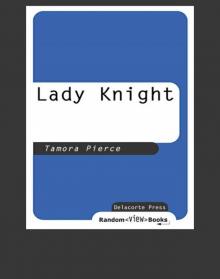 Lady Knight
Lady Knight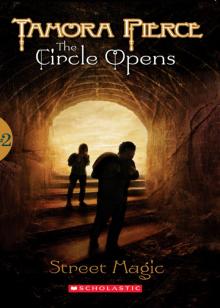 Street Magic
Street Magic Bloodhound
Bloodhound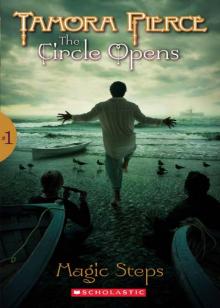 Magic Steps
Magic Steps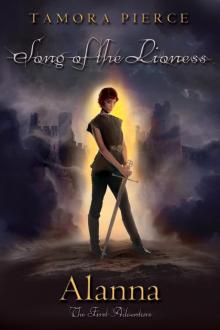 Alanna: The First Adventure
Alanna: The First Adventure Emperor Mage
Emperor Mage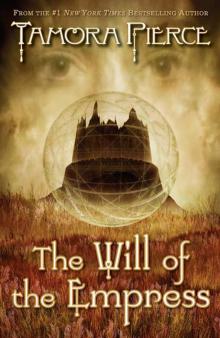 The Will of the Empress
The Will of the Empress The Realms of the Gods
The Realms of the Gods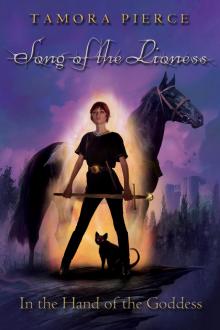 In the Hand of the Goddess
In the Hand of the Goddess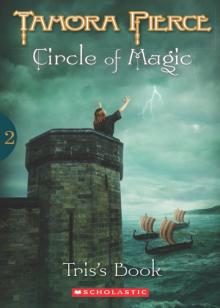 Tris's Book
Tris's Book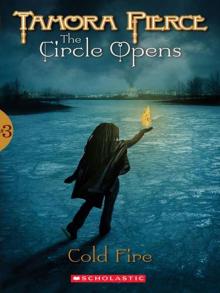 Cold Fire
Cold Fire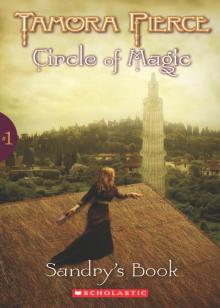 Sandry's Book
Sandry's Book Wild Magic
Wild Magic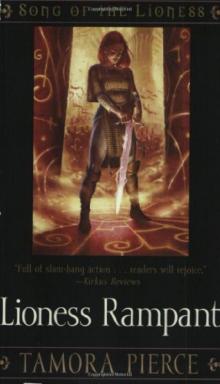 Lioness Rampant
Lioness Rampant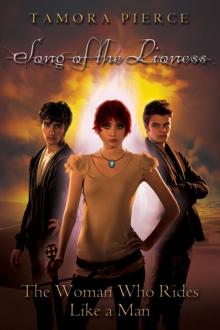 The Woman Who Rides Like a Man
The Woman Who Rides Like a Man First Test
First Test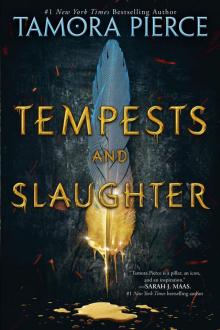 Tempests and Slaughter
Tempests and Slaughter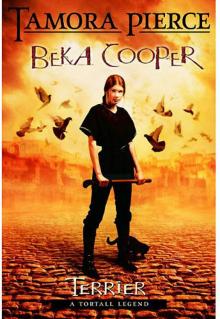 Terrier
Terrier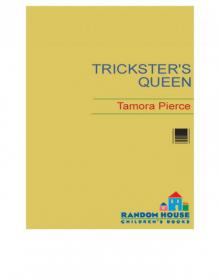 Trickster's Queen
Trickster's Queen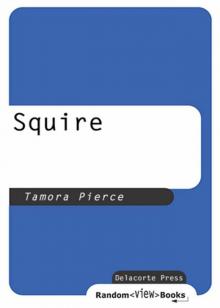 Squire
Squire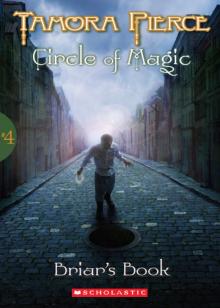 Briar's Book
Briar's Book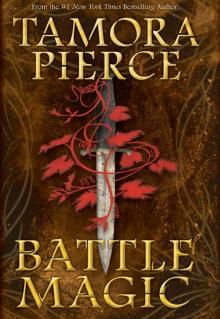 Battle Magic
Battle Magic Page
Page Melting Stones
Melting Stones Wolf-Speaker
Wolf-Speaker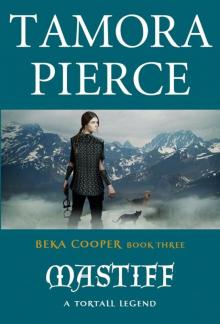 Mastiff
Mastiff The Song Of The Lioness Quartet #1 - Alanna - The First Adventure
The Song Of The Lioness Quartet #1 - Alanna - The First Adventure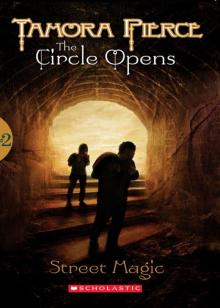 The Circle Opens #2: Street Magic: Street Magic - Reissue
The Circle Opens #2: Street Magic: Street Magic - Reissue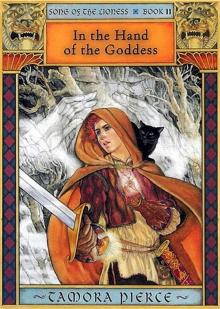 Tortall 1 - Song Of The Lioness #2 - In The Hand of the Goddess
Tortall 1 - Song Of The Lioness #2 - In The Hand of the Goddess Protector of the Small Quartet
Protector of the Small Quartet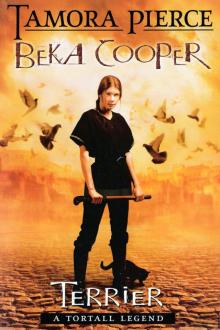 Beka Cooper 1 - Terrier
Beka Cooper 1 - Terrier Alanna
Alanna Trickster's Choice
Trickster's Choice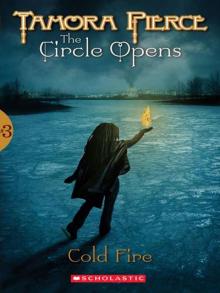 Circle Opens #03: Cold Fire
Circle Opens #03: Cold Fire In the Hand of the Goddess (The Song of the Lioness)
In the Hand of the Goddess (The Song of the Lioness)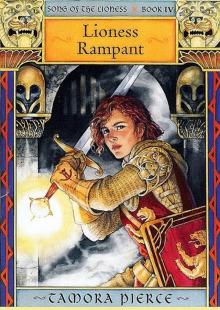 Song of the Lioness #4 - Lioness Rampant
Song of the Lioness #4 - Lioness Rampant Young Warriors
Young Warriors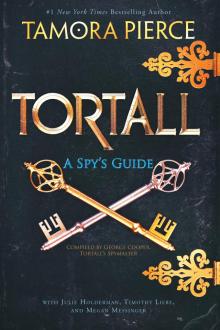 Tortall
Tortall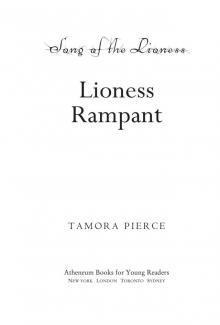 Lioness Rampant (Song of the Lioness)
Lioness Rampant (Song of the Lioness) Melting Stones (Circle Reforged)
Melting Stones (Circle Reforged)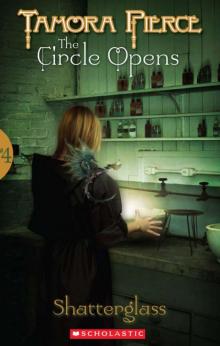 The Circle Opens #4: Shatterglass
The Circle Opens #4: Shatterglass